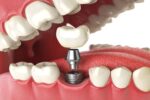A pleasant smile can lead to increased confidence and overall happiness. However, when faced with a missing tooth or teeth, deciding on the best dental restoration can be daunting. Two popular options—dental bridges and dental implants—offer effective solutions.
But which is better suited for your unique dental needs?
There are multiple factors involved in answering this question and before sitting in the dentist’s chair for the treatment. Taking a look at all of them will help you make a well-informed choice.
Making Sense of Dental Bridges
Dental bridges near you consist of a false tooth (or multiple teeth) held in place by adjacent natural teeth or implants. Traditional bridges involve crowning the neighboring teeth for support, creating a seamless replacement for the missing tooth.
Pros of Dental Bridges
Cost-Effective: Generally, bridges tend to be more cost-effective upfront compared to implants.
Quicker Process: The process of getting a bridge is usually quicker than an implant, requiring fewer appointments.
Cons of Dental Bridges
Adjacent Tooth Alteration: To place a bridge, adjacent healthy teeth need to be altered to support the bridge structure, which may weaken them over time.
Potential Longevity: While well-maintained bridges can last for years, they may need replacement after 10–15 years.
Exploring Dental Implants
Dental implants in SW Calgary involve a titanium post surgically placed into the jawbone, acting as an artificial tooth root. A custom-made crown is then affixed to the implant, mimicking the appearance and function of a natural tooth.
Pros of Dental Implants
Standalone Structure: Implants don’t rely on adjacent teeth for support, preserving the integrity of neighboring healthy teeth.
Longevity: With proper care, implants have the potential to last a lifetime, making them a durable, long-term solution.
Bone Preservation: Implants promote the jawbone to grow, minimizing bone loss that occurs when teeth are missing.
Cons of Dental Implants
Higher Initial Cost: Implants can be initially more expensive due to the surgical procedure and the materials used.
Lengthy Process: The process of getting an implant involves multiple stages and may take several months from start to finish.
So, Which Is Better? Helping You Make a Decision
Several factors play a crucial role in determining the better option for you:
Health of Surrounding Teeth: If adjacent teeth are healthy and strong, a dental implant might be a more conservative choice, preserving these teeth.
Long-Term Goals: Consider your long-term dental health objectives. Implants might be a better investment due to their potential for longevity.
Cost Considerations: While bridges are typically more affordable upfront, implants may prove cost-effective in the long run due to their durability.
Consulting a dentist in SW Calgary is what we recommended in the first place before making any final decision. Your dentist can assess your oral health, discuss your preferences, and recommend the most suitable option tailored to your specific needs.
Still Need Assistance? Consult Us at Heritage Park Dental
Both dental bridges and dental implants offer effective solutions for replacing missing teeth, each with its own set of advantages and considerations. Ultimately, the decision should be based on your oral health, long-term goals, and budget.
Remember, maintaining good oral hygiene is essential, regardless of the option chosen. Regular dental check-ups and proper care will ensure the longevity and success of whichever restoration option you opt for.
The bottom line is that, whether you choose a dental bridge or dental implant, the ultimate goal is to restore your smile, confidence, and overall oral health for years to come. We can help you look at all the options and pick the one best suited to your oral health.
Our dentist near you can help you recreate your smile!









